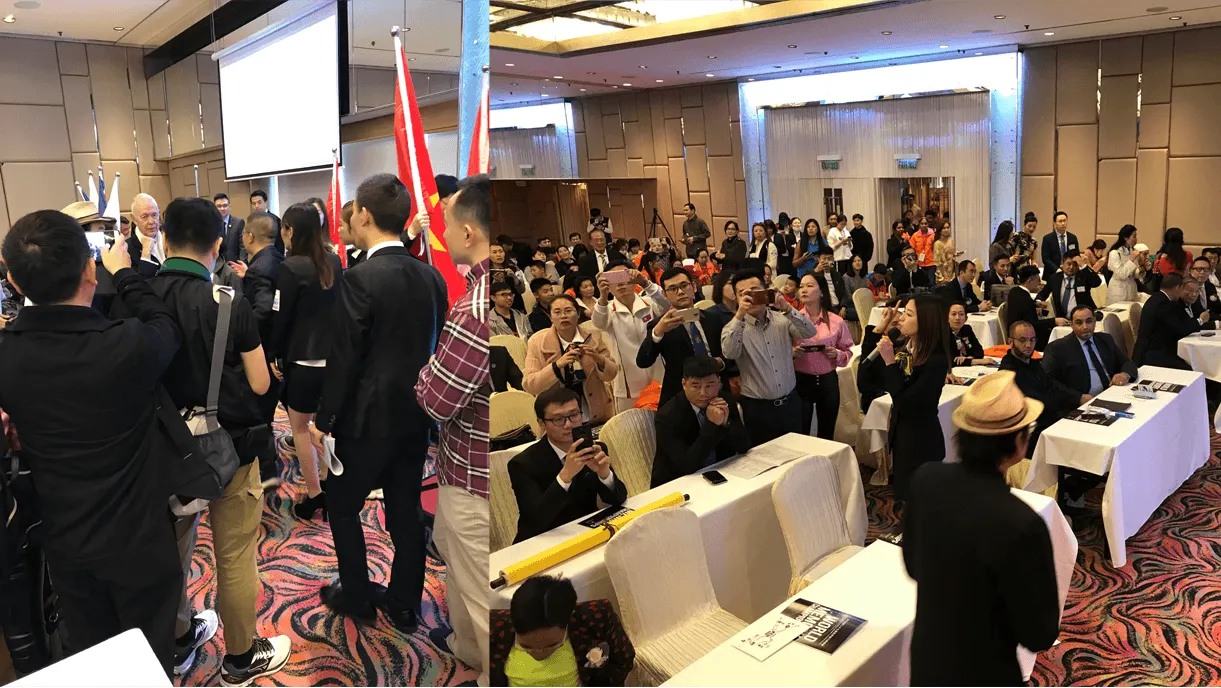Lessons on Powerful Presenting
In this post I want to talk about cultural differences when speaking and presenting and engendering a connection and interaction. Why do presentations occasionally fall flat even for the best of us? I recollect memorable, triumphant and traumatic moments from decades of speaking.
The Silent Treatment
Tony Buzan would sometimes get uncharacteristically irate with unresponsive audiences. He’d say that when working with five-year-olds he’d get shouting out and hands up but just polite silence when asking a question on a room of business people.
There are number of reasons for this:
Firstly, people who have been conditioned by years of formal education, expect to be spoon-fed answers. Tony liked to follow a more Socratic formula. He felt, I think probably rightly, that if people discover things for themselves through guided questioning, they learn better than by being given the answer. He would occasionally berate me (and others) for giving too many clues when co-presenting. The problem with this approach is that in the modern world where information is accessible instantaneously with a few taps of your phone, people expect Instant gratification rather than drawn-out debate.

In a group, especially with either strangers or more senior colleagues, there is always the fear of looking foolish. It’s far safer to allow somebody else to answer than to expose yourself to ridicule. Abraham Lincoln said, “Better to remain silent and be thought a fool than to speak and to remove all doubt.” It originates in the Bible, Provebs 17:28 - “Even a fool, when he holdeth his peace, is counted wise: and he that shutteth his lips is esteemed a man of understanding.” I know facilitators say, “The only stupid question is one unasked” but fear of looking like an idiot is a very powerful force.
Big in Japan

Tony was able to hold a room spellbound. He had the status of revered guru and therefore someone to be listened to but not necessarily spoken to. This is sometimes a cultural issue. In Japan people are very polite. They appear reserved and formal. Japan is a collectivist society where the priority is placed on the well-being of the group as a whole. This sharply contrasts to the individualistic societies often found in western countries. Once given permission to play I have found Japanese audiences to be very responsive, enthusiastic, asking smart questions. It just sometimes takes a little bit longer. When I was presenting Mind Mapping in New York it was the polar opposite. I had one or two a little over exuberant delegates to tactfully manage.
Epic Mistakes
Sometimes, you just misjudge an audience. I remember, at a memory championship Tony was opening the event with an audience almost entirely consisting of competitors. They wanted to keep their mental focus and get started. They did not want a lecture or be asked to think. Needless to say, this was a very rare occasion when Tony went down like a lead balloon.

I had a slightly similar experience. I was sent to Monte Carlo to run some one-to-one coaching on speed reading and study skills for a teenage girl. It was in a beautiful house overlooking the marina. After going through security, I was escorted into the servants’ entrance before allowing to enter the house. It turned out that the individual was not at all interested in study skills and expected a quick fix for Speed Reading. It was supposed to be two days but turned out to be just one. I learned a valuable lesson, that it is important to understand your clients’ expectations in advance so you can tailor your offering to meet their needs and not just accept a gig on face value. On this occasion though, I had an enjoyable day sightseeing in Monaco. I always remember my time there if the Grand Prix is on TV. My hotel overlooked one of the main chicanes in the course.
Living Like a Rockstar
More often than not, Tony got the Rockstar welcome. This is especially true in China. I have experienced something similar at World Memory Championships. After spending three days on stage overseeing the competition, when it came to the awards ceremony, you would have hordes of young people asking for selfies with you or sometimes autographs. This is an odd phenomenon and does give your taste of what ‘true’ celebrities feel like. Of course, it would be churlish to refuse despite feeling uncomfortably immodest.

Another, curious phenomena in China: I was welcomed to the conference room by the intro to Queen’s “We Will Rock You” banged on the desks each morning. If this happened in England you’d put it down to sarcasm but it was sincere and done out of respect.
Tipsy Teachers
On another occasion, a group of us were addressing a teachers’ conference. It was the last day of a longer event and the night before had been their closing celebrations. About two thirds of the audience were hungover and the remaining third were still drunk! Needless to say, we just abandoned most of what we’d planned and opted for some less demanding guided visualisation instead.
Cunning Kids
Speaking in schools can be interesting. I’ve had some great experiences with nice kids but occasional less then ideal situations. I was once conducting a Schools’ Memory Championship when a full-on fight broke out. I think I’d been given the ‘detention group’ and one of the lads had been taunting the other mercilessly. I stood well back. Needless to say the headteacher came down on them like a ton of bricks.
Kids can be very inventive. Another occasion, again with the Schools’ Memory Championship, I was running binary memorisation. In the World Championships if you make a mistake on a row you score half and two mistakes scores zero. This is too harsh for kids so we had a much more lenient scoring system whereby you scored one point for each correct digit and minus one for each error.
An enterprising kid did an entire page of binary. What he did was to count the number of ones in a row. If more than half were ones he filled the entire line with ones. If less than half were ones, he filled it with zeros. Thus, he could be confident that every line would at least score some points. He just memorised which lines were which (a much easier task). He ended up getting the best score in the room. I disqualified him for breaking the spirit of the rules but he got special commendation for initiative. I’m sure he’ll go far.
